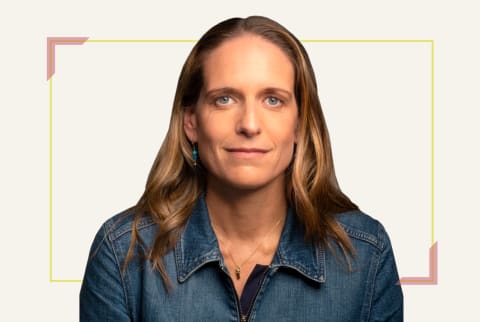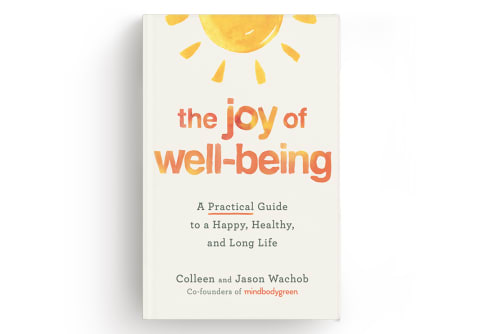Advertisement
How A Sudden Pulmonary Embolism Forced Me To Reckon With My Health


When I was a thirty-something-year-old woman working at a fast-paced corporate job, I had a life-threatening pulmonary embolism that shaped my life’s trajectory.
This experience forced me to get my mind and body back into an equilibrium to redefine a well-lived life. I tried everything—from the best in Western medicine with NYC’s best and brightest to holistic treatments with shamans and astrologers—to feel like myself again.
The first signs something was off
In May 2012, I was leaving the “Strong” class at Strala yoga and felt a bit out of breath. It was a hot Saturday morning in New York City and I brushed it off as the result of a sweaty class at the start of the summer season. I asked my husband, Jason, to meet me in the city and we walked around the West Village for a bit before I felt the need to head home. We took the A train home and after I left the train, I collapsed going up the station’s stairs. I got up, exited the subway and we called my doctor.
Unfortunately, I then proceeded to gaslight myself. I downplayed what had just happened and tried to rationalize my collapse as dehydration. No one ever wants to go to an ER, but I downplayed very clear symptoms that something was really, really wrong. I spent the rest of the weekend completely out of character, taking naps, moving very slowly, and feeling very tired.
On Monday, the only way my husband would let me go to work was if I agreed to stop by the doctor on the way to the office. I stopped to see my general practitioner, who was pretty confident that I was having a pulmonary embolism. He recommended I get in a taxi and head to the NYU emergency room.
I was so bewildered by this diagnosis that my doctor gave me a sign “I’m having a pulmonary embolism.” It was unclear if he gave me the sign because he was worried that I would not be able to articulate the likely diagnosis, or if he was concerned that I wouldn’t make it to the ER.
My diagnosis
When I got to the ER, I learned that I had showers of clots in my lungs and was very lucky to be alive. It was the start of a long healing journey.
It was a true invisible illness in that I looked fit and healthy on the outside, but on the inside I was struggling with the most fundamental element of life: breath. After my diagnosis, it was scary to ride the train on hot, crowded days when it was a struggle to breathe. I remember rushing to empty seats, sometimes beating out senior citizens, becuase I knew it would be easier to breathe when seated as opposed to standing.
I also did not have any significant predispositions to clotting, especially the markers that they test for in pregnancy, when a woman is at an increased risk of a clot. I likely got the clot from being on birth control pills, which have been associated with an increased risk of clotting1.
When I wrote an article about my pulmonary embolism on mindbodygreen, I heard from hundreds of women who had either personally experienced a clot on birth control or had a friend, sister, or cousin who had. Many times, the consequences were tragic.
I’m not against pharmaceuticals, but we do need to have more conversations about the risks involved. Nowadays, I am much more responsible about researching anything I put into my body.
My healing journey
So how did I heal? It was only when I experienced this dark moment of the soul that I was truly open to trying more holistic modalities. I leaned into shamans, healers, astrologers, and other conduits to better understand my purpose. I journaled. I did all “the things.” As this pulmonary embolism happened at a time in my life before I had children, I was able to spend a disproportionate amount of time on healing and self-care. Not all of it worked or was effective, but I didn’t have a roadmap, so I leaned into what felt good.
It was also the first time that I started to think about my breath. We breathe 17,000 to 30,000 times per day, so learning how to breathe correctly through my nose had a profound impact not just on my healing, but on my life. It connected me more to my rest and digest, or parasympathetic nervous system, to help promote a calming response in my body.
What would I have done differently? Well, I did a lot of things that didn’t have a huge ROI on my health and well-being. My friend JJ Virgin once told me “you have to bake the cake before you can put on the frosting” and I think it’s a great metaphor for well-being. You truly do have to conquer the fundamentals before you can start tinkering with wellness modalities that aren’t going to significantly move the needle.
After more than a decade post pulmonary embolism, I’ve shared all that I’ve learned along the way in my first book, which is co-authored with my husband, Jason Wachob, The Joy of Well-Being. If you are looking to weave well-being into your life, instead of chasing wellness, then this is the practical tool kit I wish I had almost a decade ago.
The takeaway
Having a pulmonary embolism was a cosmic kick in the butt from the universe that I needed to evolve my life towards the fundamentals of well-being: connection, purpose, breath, sleep, and movement. My hope is that we can all better listen to the whispers in our bodies that something is off so that we don’t have to wait for our bodies to break down to shift our life path.


















